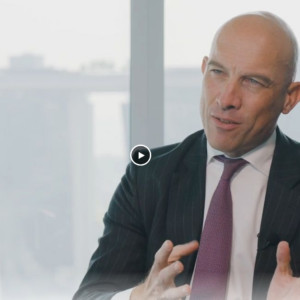Can alternatives protect portfolios from twin threats of recession and inflation?

Portfolios held by the world's wealthiest families are increasing investments into real assets, meaning private banks must develop the necessary expertise to meet this growing demand
There are two words currently on the lips of most private investors and advisers: inflation and recession. Their pre-occupation is allocating assets correctly to minimise impact of these twin, portfolio-ravaging evils.
Investment strategists agree that key client concerns revolve around the time their governments take to get inflation under control during 2022, coupled with rising probabilities of rapid recession for the global economy.
“With the inflation debate and its consequences on the monetary front driving markets and portfolio performance since the start of 2022, the strong correlation between fixed income and equity markets over the first semester has made allocation decisions very difficult,” reflects Francois Savary, chief investment officer of family office advisers Prime Partners.
This is where alternatives to shares and bonds, such as investments in unlisted companies, are once more gaining ground. “Adding private assets to an allocation is feasible for those investors that have both a significant portfolio and also the ability to remain invested with a long-term horizon, independent of the volatility experienced by liquid assets,” says Mr Savary.
This school of thought among private banks and family advisers means illiquid private markets – alongside substantial cash allocations – are once more swallowing huge chunks of portfolios held by the world’s wealthiest families.
“In a nutshell – cash is king,” says Sharmila Whelan, deputy chief economist at Asian research house Aletheia Capital. “If you believe, as I do, that inflation is here to stay, then investing in real assets, and real estate in particular, makes sense. In general, it is back to fundamentals, as with liquidity tightening, it is no longer a case of all ships rising when the tide comes in,” says Ms Whelan.
“You need to invest in companies that are fundamentally strong, with low debt and healthy balance sheets, operating in niche markets which you have conviction in.”
Surveys back these views. Research from AssetTribe – a club of family offices, wealthy investors and deal sourcers – found 53 per cent of “sophisticated” investors across Europe and the UK expect their appetite for alternative assets to increase over the next 12 months. They cited concerns about inflation, the need to diversify portfolios and the quest for higher returns as key reasons to increase allocations. Their favoured assets included real estate, infrastructure funds, forestry and direct stakes in later stage private equity projects.

Investors have also been encouraged by stellar performance numbers achieved by big brand groups such as $100bn private equity firm Advent International. Advent’s flagship $17.5bn buyout fund, invested in 2019, is currently delivering 90 per cent returns.
Although the industry has been criticised for posting exaggerated return numbers, the conversation about alternatives is clearly rumbling along inside families and between clients and advisers. The bankers say clients are asking two key questions. Firstly, how long will this window for profiting from illiquid assets stay open? And secondly, will increasing allocations to illiquid assets today actually add risk rather than reducing it?
Dramatic changes
Banks looking to facilitate this dialogue must first examine the dramatically changing role of alternatives in portfolios. Until the start of the pandemic, they were considered bond proxies, making up for the collapse in confidence and certainty surrounding fixed income allocations, traditionally favoured by private banks’ investment staff.
Today, they are once more surging to the helm of portfolios, driving returns rather than hedging them. This means alternatives will likely remain popular, even as bonds come back in an inflationary environment fuelled by Russia’s invasion of Ukraine and its associated energy crisis, against a backdrop of unprecedented pandemic-era government spending.
“The notion of bond substitutes was the narrative for alternatives in the zero years, with hedge funds playing the part of a higher yielding bond proxy,” recalls Christian Gattiker, Zurich-based chief investment strategist at Swiss bank Julius Baer. “Today, I see a lot of interest in private equity, fuelled by impact and sustainability investing trends.”
Buying directly into private markets, with a sustainability tilt, signals a mindset shift overtaking the previous regime, which offered passive filters sorting investments by environmental, social and governance (ESG) criteria. “Private equity gives you a concrete, direct stake into an investment that makes a difference,” he states.
Other bankers agree. “During the last 10 years, we have seen public markets providing access to ESG investments,” says Bill Street, chief investment officer at Quintet Private Bank. “Now a lot of private markets will move in that direction. Laws and regulations are cascading from public to private markets.”
This change of perception is likely to keep shaping investment fortunes of forthcoming generations, believes Mr Gattiker. “To my knowledge, the motives are more equity-like this time round, rather than just a substitute. It’s all about capital gains, as there was absence of yield and equity investments were more promising, linked to the alternatives space.”
High tech renaissance
In a world where chief investment officers are increasingly making thematic calls, after a pandemic hiatus when many shied away from showing their cards to industry rivals, the leveraged nature of alternative investments mean the effect of themes or megatrends can magnify potential portfolio returns.
“It may still be early days to talk about a renaissance in tech stocks,” says Mr Gattiker. “Silicon Valley re-invented itself post 2002 and now crypto stocks are undergoing a similar, uncertain pattern. The survivors will be the ones redefining the economy.”
Alternative investments, as well as quoted markets, will lead this renaissance, he believes. “Venture capital markets are always at the forefront. Something private markets are good at is spotting the new trends and being there before the IPO.”
While he cautions wealthy clients not to dive headlong into the high tech, private equity trend, Mr Gattiker is spotting green shots. “Some of the valuations have corrected massively in the innovation space. For long-term investors, that is an opportunity, but one that takes patience,” he adds.
The clean energy theme also suits private placements. “There is still a major revolution going on in energy transition,” says Mr Gattiker. He believes high-profile initiatives in electrification of road vehicles, waste treatment and recycling, combined with Russia’s role in keeping oil prices high, will ensure energy scarcity continues receiving investor attention.
“When we look at clean energy, public markets have a rich selection of investments,” he says. “But real innovations are usually in private markets, so you need a combination of both, depending on how risky and long-term you want to be in this space.”
At Citi Private Bank, head of investments David Bailin is less circumspect about a looming technology-led revival. “The call to come – once we know whether the economy is going to be recessionary or not – could be two or four months from now, but at some point, there is going to be an indication that technology shares will become interesting again,” he believes.
Once the “crazy mania” associated with the pandemic subsides, “there will be a moment when quality technology companies will become incredibly desirable”.
Citi’s rationale is that if we compare revenues of tech companies in the year to December 2019 with those in the subsequent period to June 30, 2022, “you will see a bunch of companies that have revenues 50 per cent higher and cash flows much stronger,” says Mr Bailin, with stock values of those companies resembling pre-pandemic days.
“If you can buy companies that are materially larger and financially healthier today, at the same price you could in 2019, and you believe those companies have 15 or 20 per cent growth prospects, you would want to own them. That is a point in time that is soon coming up,” he adds. “Right now, bonds are back, and in three or four months’ time, I can imagine that not only will we know where we are going with this recession issue, but that technology shares will look very attractive.”
This is not a renewed call for wealthy clients to buy into Spac (special purpose acquisition company) markets representing “speculative technology” which banks favoured in recent times, insists Mr Bailin. “We are talking about companies that over five years have established themselves in leading positions in software services, fintech and cyber security – areas in which the industry is going to grow and areas where these firms have already established leadership of those industries.”
Positions related to technology trends have been “thrown out of portfolios in a big way because we have seen an undiscerning, unrelenting technology correction,” he adds. “Markets were going up and down 5 or 6 per cent a day for certain shares, with little liquidly in a very thin market.”
Repricing venture capital
This potential trend in publicly quoted markets will be further amplified in the private markets sphere, believes Citi’s Mr Bailin. “If you think about what VC is going to go through right now, you will have a revaluation of venture portfolios and if you are a venture investor, which we are at Citi, you are going to be getting better value going forward because of today’s circumstances.”
Moreover, with Citi’s view that two years from now, rates will be lower than they are today, private equity remains “a great reserve area”, he says. “I think there is a whole repricing of venture capital – regarding tech – a repricing downward, where the next entry point will be positive, so alternatives are going to remain a 20 per cent allocation overall, in larger portfolios.”
Citi, together with competitor banks, is becoming acutely aware that these alternative investments – including private equity, hedge funds and real estate strategies – are increasingly requiring institutional expertise which private banks need to master, in order to satisfy needs of wealthy families seeking long-term returns, outside unpredictable equities and bonds.
Having lost billions for clients during the global financial crisis, due to an inability of relationship managers to match liquidity needs with lifestyle aspirations, private banks are realising they must boost quality of staff, in both investment and client servicing, to properly cater for their wealthiest customers.
While alternatives provide a comfortable fit for this story of increasing sophistication and institutionalisation, the memory of fast losses in complex assets is still less than 15 years old. “At the end of the day, most of our clients today invest almost professionally,” says Luigi Pigorini, CEO of Emea at Citi Private Bank, holding court over a frugal breakfast of yoghurt and fresh fruit at the bank’s Canary Wharf headquarters.
“It means they either have a professional family office or somebody in the family is really focused on investment as their main job, looking at the family fortune and managing the family wealth,” he says, adding the big challenges for banks such as Citi is keeping up with sophisticated clients in attracting relationship managers well-versed in machinations of complex assets.
Transformational trends
This change in the nature of clients has been one of the key trends transforming the wealth management industry. “Having either a professional or an almost professional client counterparty on the other side makes these conversations really easy,” says Mr Pigorini, who spends much of his time dealing with single family offices that dominate Citi’s client base. “They all understand that any good asset allocation ought to have a minimum of ‘illiquids’ in it in the form of alternatives, either private equity or real estate, plus a resurgence of hedge funds during the last 15 months.”
This increased professionalisation has driven heightened allocations to alternative assets. “The volumes we have been able to discuss with our clients in terms of investments in private equity, real estate and alternatives have gone up a lot,” says Mr Pigorini. “In Emea, we’re talking 30 to 40 per cent increases.”
The psychological attraction of owning alternative assets, during a period of prolonged volatility in financial markets, should also not be dismissed. “Sometimes it can be distressing to look at a Bloomberg screen, always telling you how much your portfolio is down, if invested in public markets,” he says. “But if you are invested in private markets, you don’t get that, because there is no publicly traded quote.”
This gives those private asset portfolio holders a huge psychological advantage, believes Mr Pigorini, as they can concentrate on longer-term trends, without being distracted by daily market movements.
This long-term nature of holdings naturally hampers liquidity. And as much as they claim that “this time is different”, private bankers are acutely aware we are straying deep into late cycle territory, with private allocations taking on the role which black box hedge funds fulfilled in rollercoaster fashion earlier in the century.
The $440bn California Public Employees Retirement System recently offloaded $6bn in private equity positions, discounted at around 10 per cent below current valuations. This debate around liquidity is one investment strategists are clearly having with clients, as well as internally. “The risk with any equity holdings is that if you enter within an unfavourable time frame, you may have difficulty exiting,” says Julius Baer’s Mr Gattiker.
“The more illiquid the asset, the more difficult it is to get out. But when I mention this to my colleagues who select private equity funds, they begin to roll their eyes, as they have been hearing this all the way through the cycle and I have been constantly asking them this question myself to judge market sentiment,” he admits.
“Private equity has gone through several cycles and is a much more mature asset class today. Risk is definitely on the radar, and there could be a replay [of 2008]. Valuations could be exaggerated and maybe we need to be more cautious, but from what we see, there is no evidence as yet of irrational exuberance.”
But not all wealth managers are as gung ho as Citi and Julius Baer when it comes to private markets. “Private market assets are illiquid and expensive, deficient in structural, governance and regulatory dimensions and are generally a bad idea for investors,” claims Laurence Forrester, partner at the Sorbus Partners multi-family office.
As an asset class, he says private equity and debt are often “a terrific business for those employed in running the funds, but not so much for the investors”, in a damning indictment of these institutional strategies.
Yet even Mr Forrester is not about to totally write off this intriguing asset class. “Private assets are getting more interesting,” he says. “Rising interest rates and crumbling asset prices suggest there will be distressed assets and forced sellers in the coming months and years, both of which we will look at more closely when the opportunity emerges.”
The tipping point, he believes, is not yet with us. “Not all family offices have been pushing their clients towards private market assets. We certainly have not,” says Mr Forrester. “Boosting allocations right now would be foolhardy when valuations are crumbling and rising interest rates and recession undermines the rationale of many private market investment decisions. The time will come, but it is not today.”



